
Hemesha Jawaan Geet
, Tribute to SriLanka Brodcasting Corporation
  |
| khawar Sohail |
 Sep 8 2010, 04:27 PM Sep 8 2010, 04:27 PM
Post
#151
|
|
Regular Member  Group: Members Posts: 837 Joined: 28-July 07 Member No.: 19849 |
Another beautiful ghazal. ..khawar
|
| khawar Sohail |
 Sep 8 2010, 04:29 PM Sep 8 2010, 04:29 PM
Post
#152
|
|
Regular Member  Group: Members Posts: 837 Joined: 28-July 07 Member No.: 19849 |
Now lets turn to Madhok/Gyanndutt combination. Sung by Geeta...khawar
|
| khawar Sohail |
 Sep 10 2010, 06:57 AM Sep 10 2010, 06:57 AM
Post
#153
|
|
Regular Member  Group: Members Posts: 837 Joined: 28-July 07 Member No.: 19849 |
As the Lata 81st Birthday is approaching, I urgently need her 3 songs in reasonable or good recording quality. I will be grateful if anybody can upload...Thanking in advance...khawar
1.Lo woh aai nindiya re.....mandir...1948....vasant desai 2. kabhi hans hans ke.....chakori...1949.....hanshaj behl 3. jia naheen laage ho mera.......badnaam......1952......basant prakash |
| khawar Sohail |
 Sep 10 2010, 07:13 AM Sep 10 2010, 07:13 AM
Post
#154
|
|
Regular Member  Group: Members Posts: 837 Joined: 28-July 07 Member No.: 19849 |
I am u/l SD Burman first compositions from film SHIKAARI 1946. Both songs are sung by Paaro....khawar
PS: the song Chup chup is 3-10 min duration and not 5.59 min. S. D. Burman (1906-1975)Known as "Sachin Karta" to the music connoisseurs of Kolkata, "Burman Dada" as fondly called by the musicians of Bombay, "Shochin Deb Bormon" by the radio listeners of Bangladesh and West Bengal, India, "S.D. Burman" by the film cine goers or simply "SD" by his film fans, was born on October 1, 1906 at Komilla in a Royal family of Tripura. His uncles deceived his father and conquered the throne. As a result, Burman family had to live in isolation like refugees in their own kingdom. Many stories, myths and rumors isolated young Sachin even further. With unrest and disturbed mind, he used to wander in streets of Agartala. He did not like school much but was passionate about music and sports. His father Navdweep Chandra Burman was Sitarist and a Dhrupad singer. Kumar Sachin had first music lessons from him. Later on he learnt from Krishna Chandra Dey, Badal Khan, Girija Shankar Chakraborty and Baba Allauddin Khan of Maihar [father of Ali Akbar Khan and father in law of Ravi Shankar]. He was in close association with a Sufi saint Saheb Ali and had recorded several songs of Saheb Ali. He learnt folk music of Bengal such as Bhatiali, Baul, Bangla Keertan from many gurus. He borrowed freely from folk music and composed several songs both in Hindi and in Bengali. He used to handle and play several instruments and had a mastery over sitar and flute. His passion and interest in football was so deep that organizers of major football matches used to invite him as referee. Soon he became star football player, singer and a musician. No wonder then that he received an invitation from the Hindusthan Musical Products Ltd. Calcutta for cutting gramophone discs on their Hindusthan record label. He cut his first Bengali song disc in September 1932 at the age of twenty-six years and it was released on ‘Hindusthan’ label. The record label reads as: by Kumar Sachin Dev Burman. The word ‘Kumar’ relates to his stature as a Royal Prince (Raj Kumar) and not as a child prodigy. Later on he dropped this title ‘Kumar’. Hindusthan Main List catalogue published in 1966 gives following information about his Hindi records: Kumar Sachin Dev Varma H 461 Nain More Daras / Preetmen Huve Badnaam H 548 Aab Main Sharan Tumhare / Mere Preetam Pyare H 922 Chale Chalo Premke Sathi / Premki Pyari Nishani H 1001 Dheerese Jana Bagiyanmen / Kaun Nagariya Jaore H 1094 Pile Harinaamka Pyala / Mere Shyam Suno Meri H 1179 Balam Mujhse Ruthke / Mere Jobanke Phulwari 51 H 1211 Nainonke Suljhake / Rimjhim Rimjhim H 1321 Gundham Hamare / Sab Deshki Janata Kumar Sachin Dev Varma and Meera Dev Varma H 1232 Phulgendava Na Maro / Tumho Bade Chitchor --------------------------------------------------------------------------- Due to the popularity and sale of these discs, some songs were reissued on EP and LP records by the Hindusthan records. Later on he also recorded prolifically for the Gramophone Company and many 78-rpm records were issued on HMV label. Compressive list is under preparation. As per the information from the record collectors, details of his solo songs are: Hindusthan records – 55 songs, HMV - 19 songs and 4 songs on Super Seven HMV EP. Reissued on EP’s – Angel: 6, Hindusthan: 8, HMV: 3 LP’s – HMV: 4, Hindusthan: 3 Thus, in all 102 songs are available on discs. He has composed most of his songs himself except 17 that were composed by Sursagar Himanshu Dutt and Kazi Nasrul Islam. His lyricists are: Ajay Bhattacharya, Meera Dev Burman, Gouriprasanna Mujumdar, Mohini Choudhury, Kazi Nasrul Islam, Munshi Zahid Hussain, Pandit Bhushan, Shailendra, Majrooh Sultanpuri and Anand Bakshi. ------------------------------------------------------------------------------------------------------------ He used tunes of his several Bengali songs in Hindi films. Some examples are: Pavan Diwani (Dr. Vidya), Jhan Jhan Payal Baje (Buzdil), Jane Kya Tune Kahi (Pyasa), Nain Churaye Chain Churaye (Anurag), Hum Bekhudimen Tumko (Kala Pani), Vahan Kaun Hai Tera (Guide), Khai Haire Humne Kasam (Talash). These songs are hit even today because of their origin in sufi and devotional music. Between 1937-43, he recorded these songs on 78-rpm discs. He also composed music for five Bengali films: Rajshree, Nirbadshan, Jeevan Sangini, Chadma Beshi and Matir Ghar. In 1966, ‘Matir Ghar’ was re-made in Nepali language as ‘Maiti Ghar’ and music of this film was composed by his assistant Jaidev. In 1942, film producer Mr. Chandulal Shaha of Ranjit studio invited him to work with him in Bombay but he did not come. Rai Bahadur Chunilal, Sushil Mujumdar and Shashdhar Mukherjee of Filmisthan studio persuaded him and in 1944, he shifted to Bombay and settled with his family. As a composer, Filmisthan’s 52 Shikari (1946) was his first Hindi film. He met Dev Anand in 1948 and then he was the music director for most of Navketan’s films. His association with Dev Anand was a long one beginning with Afsar (1950), Bazi, Taxi Driver, Ghar no.44, Fantoosh, Nau Do Gyarah, Kala Pani, Kala Bazzar, Guide, Jewel Thief, Prem Pujari, and Tere Mere Sapne (1971) . He also composed music for other Dev’s films on other banners such as Paying Guest, Teen Devinya and Munimji and the songs were very popular. During 1950-60, Hindi films were centered around Raj Kapoor, Dev Anand and Dilip Kumar with their own set of musicians and singers. Rafi and Mukesh were the singing voices of Dilip Kumar and Raj Kapoor respectively. In such a situation, Sachnda used every available voice for Dev Anand. In the beginning Hemant Kumar sang ‘Gupchup Gupchup Pyar Karen’ (Saja, 1951), ‘Ye Raat Ye Chandani Phir Kahan’ (Jaal, 1952), ‘Ter i Duniya Men Jeenese’, ‘Chup Hai Dharati Chup Hai Chand Sitare’ (Ghar no. 44, 1955) for Dev. Talat Mehmood sang ‘Jayen To Jayen Kahan’ in film Ta xi Driver. In Munimji (1955), Dev sang ‘Jeevanke Safarmen Rahi’ in Kishore Kumar’s voice whereas in the same film, Hemant Kumar lent him his voice for the song ‘O Shivji Byahane Chale’. Later on both Mohammad Rafi and Kishore Kumar sang many songs for Dev Anand and cine-goers never found it odd. Although S. D. Burman was at home in Navketan camp, he composed wonderful music for many films of Bimal Roy and Guru Dutt. These songs are remembered by film music lovers of all generations. He used large musical canvas using words, chorus, tonal colors of instruments and orchestration in the following songs: ‘Bichade Sabhi Bari Bari, ‘Waqt Ne Kiya Kya Hansi Sitam’ (Kagaz Ke Phool), ‘Jane Wo Kaise Loga The Jinke’. ‘Jinhe Naj Hai Hindpar Wo Kahan Hai’, ‘Ye Duniya Agar Mil Jayen To Kya Hai’ (Pyasa). In spite of the rudimentary recording equipment of 50’s, his songs are real masterpieces. The songs were based on classical, light classical, folk and devotional music. He also composed several duets, comedy, and cabaret numbers. This was part of his profession that he had chosen. His family members and relatives criticized him heavily for diluting and commercializing the art. Towards the end of his life, he severed the relations with Agartala. Although he was denied the princely throne in Tripura, he ruled over the hearts of millions of music lovers. He was a simple man wearing dhoti-kurta and liked tamkuwala paan very much. His life style was simple but he was extremely miser, money conscious and preferred to live in isolation. He used to say, “ Make yourself rare, then only people pay you attention in this film industry”. He has sung very few solo songs in Hindi films and composed songs for Mukesh. Although both of them had distinct voices, one can hear sufi/devotional music in their songs. Some examples of Mukesh songs are: ‘Ae Dile Awara Chal’ (Dr.Vidya), ‘O Janewale Ho Sake To Lautke Aana’ (Bandini), ‘Ye Kisne Geet Cheda’ (Meri Surat Teri Aankhe), ‘Chalri Sajani Aab Kya Soche’ (Bambai ka Babu), whereas those of S. D. Burman are: ‘Wanha Kaun Hai Tera’ (Guide), 53 ‘Suno Mere Bandhu Re’ (Bandini), ‘O Re Manjhi’ (Sujata), ‘Saphal Hogi Teri Aradhana’ (Aradhana) and many others. It is interesting to note that beginning with Mashal of 1950 to Barood of 1976, Lata Mangeshkar has sung 132 solo songs composed by S. D. Burman. Among other singers, number of songs are: Asha Bhosle (75), Kishore Kumar (53), Mohammad Rafi (45) and Geeta Dutt (44). He set tunes to the songs of 27 lyricists and 57 singers have sung them. He has composed about 700 songs in 90 Hindi and five Bengali films out of which 157 Hindi film songs are duets. Today, towards the closure of S. D. Burman’s birth centenary, most of his film songs are available on CD’s and tapes. Internet sites are full with lot of information. However, his Hindi and Bengali private songs are relatively less known. Many of these songs need to be reissued and preserved for posterity and researchers of film music. S. D. Burman passed away on October 31, 1975 at the age of 69 years. However his voice and music is alive for ever. Bengali Films of S. D. Burman: 1937 Rajshree 1940 Rajkumar Nirbadshan 1943 Jeevan Sangini 1943 Chadma Beshi 1943 Matir Ghar Hindi Films of S. D. Burman: 1946: Shikari, Aath Din 1947 Do Bhai, Dilki Rani, Chittod Vijay 1948 Vidya 1949 Kamal, Shabnam 1950 Afsar, Mashal, Pyar 1951 Baji, Bahar, Bujhdil, Ek Nazar, Naujawan, Saza 1952 Jal, Lal Kunwar 1953 Arman, Babla, Jeevan Jyoti, Shahanshah 1954 Aangare, Chalis Baba Ek Chor, Radha Krishna, Taxi driver 1955 Devdas, Ghar Number Chavalis, Madbhare Nain, Munimji, Society 1956 Fantoosh 1957 Miss India, Nay Do Gyarah, Paying Guest, Pyasa 1958 Chaltika Naam Gadi, Kala Pani, Lajwanti, Sitaronse Aage, Solvan Saal 1959 Insan Jaag Utha, Kagazke Phool, Sujata 1960 Apna Haath Jagannath, Bambaika Babu, Bewakuf, Ek Ke Baad Ek, Kala Bazzar, Manjhil, Miyan Bibi Raji 1962 Baat Ek Raatki, Dr. Vidya, Naughty Boy 1963 Bandini, Meri Surat Teri Aankhen, Tere Gharke Samne 1964 Benzir, Kainse Kahun, Ziddi 1965 Guide, Teen Devinyan 1967 Jewel Thief 1969 Jyoti, Aradhana, Talash 1970 Ishq Per Jor Nahin, Prem Pujari 1971 Gambler, Naya Zamana, Sharmili, Tere Mere Sapne 1972 Anurag, Ye Gulistan Hamara, Zindagi Zindagai 1973 Abhiman, Chupa Rustom, Jugnu, Phagun 1974 Prem Nagar, Sagina, Us Par 1975 Chupke Chupke, Mili 1976 Arjun Pandit, Barood, Tyag, Diwangi ? Saaz [between 1950-60] |
| khawar Sohail |
 Sep 10 2010, 04:25 PM Sep 10 2010, 04:25 PM
Post
#155
|
|
Regular Member  Group: Members Posts: 837 Joined: 28-July 07 Member No.: 19849 |
I am u/l SD Burman first compositions from film SHIKAARI 1946. Both songs are sung by Paaro....khawar PS: the song Chup chup is 3-10 min duration and not 5.59 min. S. D. Burman (1906-1975)Known as "Sachin Karta" to the music connoisseurs of Kolkata, "Burman Dada" as fondly called by the musicians of Bombay, "Shochin Deb Bormon" by the radio listeners of Bangladesh and West Bengal, India, "S.D. Burman" by the film cine goers or simply "SD" by his film fans, was born on October 1, 1906 at Komilla in a Royal family of Tripura. His uncles deceived his father and conquered the throne. As a result, Burman family had to live in isolation like refugees in their own kingdom. Many stories, myths and rumors isolated young Sachin even further. With unrest and disturbed mind, he used to wander in streets of Agartala. He did not like school much but was passionate about music and sports. His father Navdweep Chandra Burman was Sitarist and a Dhrupad singer. Kumar Sachin had first music lessons from him. Later on he learnt from Krishna Chandra Dey, Badal Khan, Girija Shankar Chakraborty and Baba Allauddin Khan of Maihar [father of Ali Akbar Khan and father in law of Ravi Shankar]. He was in close association with a Sufi saint Saheb Ali and had recorded several songs of Saheb Ali. He learnt folk music of Bengal such as Bhatiali, Baul, Bangla Keertan from many gurus. He borrowed freely from folk music and composed several songs both in Hindi and in Bengali. He used to handle and play several instruments and had a mastery over sitar and flute. His passion and interest in football was so deep that organizers of major football matches used to invite him as referee. Soon he became star football player, singer and a musician. No wonder then that he received an invitation from the Hindusthan Musical Products Ltd. Calcutta for cutting gramophone discs on their Hindusthan record label. He cut his first Bengali song disc in September 1932 at the age of twenty-six years and it was released on ‘Hindusthan’ label. The record label reads as: by Kumar Sachin Dev Burman. The word ‘Kumar’ relates to his stature as a Royal Prince (Raj Kumar) and not as a child prodigy. Later on he dropped this title ‘Kumar’. Hindusthan Main List catalogue published in 1966 gives following information about his Hindi records: Kumar Sachin Dev Varma H 461 Nain More Daras / Preetmen Huve Badnaam H 548 Aab Main Sharan Tumhare / Mere Preetam Pyare H 922 Chale Chalo Premke Sathi / Premki Pyari Nishani H 1001 Dheerese Jana Bagiyanmen / Kaun Nagariya Jaore H 1094 Pile Harinaamka Pyala / Mere Shyam Suno Meri H 1179 Balam Mujhse Ruthke / Mere Jobanke Phulwari 51 H 1211 Nainonke Suljhake / Rimjhim Rimjhim H 1321 Gundham Hamare / Sab Deshki Janata Kumar Sachin Dev Varma and Meera Dev Varma H 1232 Phulgendava Na Maro / Tumho Bade Chitchor --------------------------------------------------------------------------- Due to the popularity and sale of these discs, some songs were reissued on EP and LP records by the Hindusthan records. Later on he also recorded prolifically for the Gramophone Company and many 78-rpm records were issued on HMV label. Compressive list is under preparation. As per the information from the record collectors, details of his solo songs are: Hindusthan records – 55 songs, HMV - 19 songs and 4 songs on Super Seven HMV EP. Reissued on EP’s – Angel: 6, Hindusthan: 8, HMV: 3 LP’s – HMV: 4, Hindusthan: 3 Thus, in all 102 songs are available on discs. He has composed most of his songs himself except 17 that were composed by Sursagar Himanshu Dutt and Kazi Nasrul Islam. His lyricists are: Ajay Bhattacharya, Meera Dev Burman, Gouriprasanna Mujumdar, Mohini Choudhury, Kazi Nasrul Islam, Munshi Zahid Hussain, Pandit Bhushan, Shailendra, Majrooh Sultanpuri and Anand Bakshi. ------------------------------------------------------------------------------------------------------------ He used tunes of his several Bengali songs in Hindi films. Some examples are: Pavan Diwani (Dr. Vidya), Jhan Jhan Payal Baje (Buzdil), Jane Kya Tune Kahi (Pyasa), Nain Churaye Chain Churaye (Anurag), Hum Bekhudimen Tumko (Kala Pani), Vahan Kaun Hai Tera (Guide), Khai Haire Humne Kasam (Talash). These songs are hit even today because of their origin in sufi and devotional music. Between 1937-43, he recorded these songs on 78-rpm discs. He also composed music for five Bengali films: Rajshree, Nirbadshan, Jeevan Sangini, Chadma Beshi and Matir Ghar. In 1966, ‘Matir Ghar’ was re-made in Nepali language as ‘Maiti Ghar’ and music of this film was composed by his assistant Jaidev. In 1942, film producer Mr. Chandulal Shaha of Ranjit studio invited him to work with him in Bombay but he did not come. Rai Bahadur Chunilal, Sushil Mujumdar and Shashdhar Mukherjee of Filmisthan studio persuaded him and in 1944, he shifted to Bombay and settled with his family. As a composer, Filmisthan’s 52 Shikari (1946) was his first Hindi film. He met Dev Anand in 1948 and then he was the music director for most of Navketan’s films. His association with Dev Anand was a long one beginning with Afsar (1950), Bazi, Taxi Driver, Ghar no.44, Fantoosh, Nau Do Gyarah, Kala Pani, Kala Bazzar, Guide, Jewel Thief, Prem Pujari, and Tere Mere Sapne (1971) . He also composed music for other Dev’s films on other banners such as Paying Guest, Teen Devinya and Munimji and the songs were very popular. During 1950-60, Hindi films were centered around Raj Kapoor, Dev Anand and Dilip Kumar with their own set of musicians and singers. Rafi and Mukesh were the singing voices of Dilip Kumar and Raj Kapoor respectively. In such a situation, Sachnda used every available voice for Dev Anand. In the beginning Hemant Kumar sang ‘Gupchup Gupchup Pyar Karen’ (Saja, 1951), ‘Ye Raat Ye Chandani Phir Kahan’ (Jaal, 1952), ‘Ter i Duniya Men Jeenese’, ‘Chup Hai Dharati Chup Hai Chand Sitare’ (Ghar no. 44, 1955) for Dev. Talat Mehmood sang ‘Jayen To Jayen Kahan’ in film Ta xi Driver. In Munimji (1955), Dev sang ‘Jeevanke Safarmen Rahi’ in Kishore Kumar’s voice whereas in the same film, Hemant Kumar lent him his voice for the song ‘O Shivji Byahane Chale’. Later on both Mohammad Rafi and Kishore Kumar sang many songs for Dev Anand and cine-goers never found it odd. Although S. D. Burman was at home in Navketan camp, he composed wonderful music for many films of Bimal Roy and Guru Dutt. These songs are remembered by film music lovers of all generations. He used large musical canvas using words, chorus, tonal colors of instruments and orchestration in the following songs: ‘Bichade Sabhi Bari Bari, ‘Waqt Ne Kiya Kya Hansi Sitam’ (Kagaz Ke Phool), ‘Jane Wo Kaise Loga The Jinke’. ‘Jinhe Naj Hai Hindpar Wo Kahan Hai’, ‘Ye Duniya Agar Mil Jayen To Kya Hai’ (Pyasa). In spite of the rudimentary recording equipment of 50’s, his songs are real masterpieces. The songs were based on classical, light classical, folk and devotional music. He also composed several duets, comedy, and cabaret numbers. This was part of his profession that he had chosen. His family members and relatives criticized him heavily for diluting and commercializing the art. Towards the end of his life, he severed the relations with Agartala. Although he was denied the princely throne in Tripura, he ruled over the hearts of millions of music lovers. He was a simple man wearing dhoti-kurta and liked tamkuwala paan very much. His life style was simple but he was extremely miser, money conscious and preferred to live in isolation. He used to say, “ Make yourself rare, then only people pay you attention in this film industry”. He has sung very few solo songs in Hindi films and composed songs for Mukesh. Although both of them had distinct voices, one can hear sufi/devotional music in their songs. Some examples of Mukesh songs are: ‘Ae Dile Awara Chal’ (Dr.Vidya), ‘O Janewale Ho Sake To Lautke Aana’ (Bandini), ‘Ye Kisne Geet Cheda’ (Meri Surat Teri Aankhe), ‘Chalri Sajani Aab Kya Soche’ (Bambai ka Babu), whereas those of S. D. Burman are: ‘Wanha Kaun Hai Tera’ (Guide), 53 ‘Suno Mere Bandhu Re’ (Bandini), ‘O Re Manjhi’ (Sujata), ‘Saphal Hogi Teri Aradhana’ (Aradhana) and many others. It is interesting to note that beginning with Mashal of 1950 to Barood of 1976, Lata Mangeshkar has sung 132 solo songs composed by S. D. Burman. Among other singers, number of songs are: Asha Bhosle (75), Kishore Kumar (53), Mohammad Rafi (45) and Geeta Dutt (44). He set tunes to the songs of 27 lyricists and 57 singers have sung them. He has composed about 700 songs in 90 Hindi and five Bengali films out of which 157 Hindi film songs are duets. Today, towards the closure of S. D. Burman’s birth centenary, most of his film songs are available on CD’s and tapes. Internet sites are full with lot of information. However, his Hindi and Bengali private songs are relatively less known. Many of these songs need to be reissued and preserved for posterity and researchers of film music. S. D. Burman passed away on October 31, 1975 at the age of 69 years. However his voice and music is alive for ever. Bengali Films of S. D. Burman: 1937 Rajshree 1940 Rajkumar Nirbadshan 1943 Jeevan Sangini 1943 Chadma Beshi 1943 Matir Ghar Hindi Films of S. D. Burman: 1946: Shikari, Aath Din 1947 Do Bhai, Dilki Rani, Chittod Vijay 1948 Vidya 1949 Kamal, Shabnam 1950 Afsar, Mashal, Pyar 1951 Baji, Bahar, Bujhdil, Ek Nazar, Naujawan, Saza 1952 Jal, Lal Kunwar 1953 Arman, Babla, Jeevan Jyoti, Shahanshah 1954 Aangare, Chalis Baba Ek Chor, Radha Krishna, Taxi driver 1955 Devdas, Ghar Number Chavalis, Madbhare Nain, Munimji, Society 1956 Fantoosh 1957 Miss India, Nay Do Gyarah, Paying Guest, Pyasa 1958 Chaltika Naam Gadi, Kala Pani, Lajwanti, Sitaronse Aage, Solvan Saal 1959 Insan Jaag Utha, Kagazke Phool, Sujata 1960 Apna Haath Jagannath, Bambaika Babu, Bewakuf, Ek Ke Baad Ek, Kala Bazzar, Manjhil, Miyan Bibi Raji 1962 Baat Ek Raatki, Dr. Vidya, Naughty Boy 1963 Bandini, Meri Surat Teri Aankhen, Tere Gharke Samne 1964 Benzir, Kainse Kahun, Ziddi 1965 Guide, Teen Devinyan 1967 Jewel Thief 1969 Jyoti, Aradhana, Talash 1970 Ishq Per Jor Nahin, Prem Pujari 1971 Gambler, Naya Zamana, Sharmili, Tere Mere Sapne 1972 Anurag, Ye Gulistan Hamara, Zindagi Zindagai 1973 Abhiman, Chupa Rustom, Jugnu, Phagun 1974 Prem Nagar, Sagina, Us Par 1975 Chupke Chupke, Mili 1976 Arjun Pandit, Barood, Tyag, Diwangi ? Saaz [between 1950-60] |
| khawar Sohail |
 Sep 10 2010, 04:30 PM Sep 10 2010, 04:30 PM
Post
#156
|
|
Regular Member  Group: Members Posts: 837 Joined: 28-July 07 Member No.: 19849 |
I am u/l SD Burman first compositions from film SHIKAARI 1946. Both songs are sung by Paaro....khawar PS: the song Chup chup is 3-10 min duration and not 5.59 min. S. D. Burman (1906-1975)Known as "Sachin Karta" to the music connoisseurs of Kolkata, "Burman Dada" as fondly called by the musicians of Bombay, "Shochin Deb Bormon" by the radio listeners of Bangladesh and West Bengal, India, "S.D. Burman" by the film cine goers or simply "SD" by his film fans, was born on October 1, 1906 at Komilla in a Royal family of Tripura. His uncles deceived his father and conquered the throne. As a result, Burman family had to live in isolation like refugees in their own kingdom. Many stories, myths and rumors isolated young Sachin even further. With unrest and disturbed mind, he used to wander in streets of Agartala. He did not like school much but was passionate about music and sports. His father Navdweep Chandra Burman was Sitarist and a Dhrupad singer. Kumar Sachin had first music lessons from him. Later on he learnt from Krishna Chandra Dey, Badal Khan, Girija Shankar Chakraborty and Baba Allauddin Khan of Maihar [father of Ali Akbar Khan and father in law of Ravi Shankar]. He was in close association with a Sufi saint Saheb Ali and had recorded several songs of Saheb Ali. He learnt folk music of Bengal such as Bhatiali, Baul, Bangla Keertan from many gurus. He borrowed freely from folk music and composed several songs both in Hindi and in Bengali. He used to handle and play several instruments and had a mastery over sitar and flute. His passion and interest in football was so deep that organizers of major football matches used to invite him as referee. Soon he became star football player, singer and a musician. No wonder then that he received an invitation from the Hindusthan Musical Products Ltd. Calcutta for cutting gramophone discs on their Hindusthan record label. He cut his first Bengali song disc in September 1932 at the age of twenty-six years and it was released on ‘Hindusthan’ label. The record label reads as: by Kumar Sachin Dev Burman. The word ‘Kumar’ relates to his stature as a Royal Prince (Raj Kumar) and not as a child prodigy. Later on he dropped this title ‘Kumar’. Hindusthan Main List catalogue published in 1966 gives following information about his Hindi records: Kumar Sachin Dev Varma H 461 Nain More Daras / Preetmen Huve Badnaam H 548 Aab Main Sharan Tumhare / Mere Preetam Pyare H 922 Chale Chalo Premke Sathi / Premki Pyari Nishani H 1001 Dheerese Jana Bagiyanmen / Kaun Nagariya Jaore H 1094 Pile Harinaamka Pyala / Mere Shyam Suno Meri H 1179 Balam Mujhse Ruthke / Mere Jobanke Phulwari 51 H 1211 Nainonke Suljhake / Rimjhim Rimjhim H 1321 Gundham Hamare / Sab Deshki Janata Kumar Sachin Dev Varma and Meera Dev Varma H 1232 Phulgendava Na Maro / Tumho Bade Chitchor --------------------------------------------------------------------------- Due to the popularity and sale of these discs, some songs were reissued on EP and LP records by the Hindusthan records. Later on he also recorded prolifically for the Gramophone Company and many 78-rpm records were issued on HMV label. Compressive list is under preparation. As per the information from the record collectors, details of his solo songs are: Hindusthan records – 55 songs, HMV - 19 songs and 4 songs on Super Seven HMV EP. Reissued on EP’s – Angel: 6, Hindusthan: 8, HMV: 3 LP’s – HMV: 4, Hindusthan: 3 Thus, in all 102 songs are available on discs. He has composed most of his songs himself except 17 that were composed by Sursagar Himanshu Dutt and Kazi Nasrul Islam. His lyricists are: Ajay Bhattacharya, Meera Dev Burman, Gouriprasanna Mujumdar, Mohini Choudhury, Kazi Nasrul Islam, Munshi Zahid Hussain, Pandit Bhushan, Shailendra, Majrooh Sultanpuri and Anand Bakshi. ------------------------------------------------------------------------------------------------------------ He used tunes of his several Bengali songs in Hindi films. Some examples are: Pavan Diwani (Dr. Vidya), Jhan Jhan Payal Baje (Buzdil), Jane Kya Tune Kahi (Pyasa), Nain Churaye Chain Churaye (Anurag), Hum Bekhudimen Tumko (Kala Pani), Vahan Kaun Hai Tera (Guide), Khai Haire Humne Kasam (Talash). These songs are hit even today because of their origin in sufi and devotional music. Between 1937-43, he recorded these songs on 78-rpm discs. He also composed music for five Bengali films: Rajshree, Nirbadshan, Jeevan Sangini, Chadma Beshi and Matir Ghar. In 1966, ‘Matir Ghar’ was re-made in Nepali language as ‘Maiti Ghar’ and music of this film was composed by his assistant Jaidev. In 1942, film producer Mr. Chandulal Shaha of Ranjit studio invited him to work with him in Bombay but he did not come. Rai Bahadur Chunilal, Sushil Mujumdar and Shashdhar Mukherjee of Filmisthan studio persuaded him and in 1944, he shifted to Bombay and settled with his family. As a composer, Filmisthan’s 52 Shikari (1946) was his first Hindi film. He met Dev Anand in 1948 and then he was the music director for most of Navketan’s films. His association with Dev Anand was a long one beginning with Afsar (1950), Bazi, Taxi Driver, Ghar no.44, Fantoosh, Nau Do Gyarah, Kala Pani, Kala Bazzar, Guide, Jewel Thief, Prem Pujari, and Tere Mere Sapne (1971) . He also composed music for other Dev’s films on other banners such as Paying Guest, Teen Devinya and Munimji and the songs were very popular. During 1950-60, Hindi films were centered around Raj Kapoor, Dev Anand and Dilip Kumar with their own set of musicians and singers. Rafi and Mukesh were the singing voices of Dilip Kumar and Raj Kapoor respectively. In such a situation, Sachnda used every available voice for Dev Anand. In the beginning Hemant Kumar sang ‘Gupchup Gupchup Pyar Karen’ (Saja, 1951), ‘Ye Raat Ye Chandani Phir Kahan’ (Jaal, 1952), ‘Ter i Duniya Men Jeenese’, ‘Chup Hai Dharati Chup Hai Chand Sitare’ (Ghar no. 44, 1955) for Dev. Talat Mehmood sang ‘Jayen To Jayen Kahan’ in film Ta xi Driver. In Munimji (1955), Dev sang ‘Jeevanke Safarmen Rahi’ in Kishore Kumar’s voice whereas in the same film, Hemant Kumar lent him his voice for the song ‘O Shivji Byahane Chale’. Later on both Mohammad Rafi and Kishore Kumar sang many songs for Dev Anand and cine-goers never found it odd. Although S. D. Burman was at home in Navketan camp, he composed wonderful music for many films of Bimal Roy and Guru Dutt. These songs are remembered by film music lovers of all generations. He used large musical canvas using words, chorus, tonal colors of instruments and orchestration in the following songs: ‘Bichade Sabhi Bari Bari, ‘Waqt Ne Kiya Kya Hansi Sitam’ (Kagaz Ke Phool), ‘Jane Wo Kaise Loga The Jinke’. ‘Jinhe Naj Hai Hindpar Wo Kahan Hai’, ‘Ye Duniya Agar Mil Jayen To Kya Hai’ (Pyasa). In spite of the rudimentary recording equipment of 50’s, his songs are real masterpieces. The songs were based on classical, light classical, folk and devotional music. He also composed several duets, comedy, and cabaret numbers. This was part of his profession that he had chosen. His family members and relatives criticized him heavily for diluting and commercializing the art. Towards the end of his life, he severed the relations with Agartala. Although he was denied the princely throne in Tripura, he ruled over the hearts of millions of music lovers. He was a simple man wearing dhoti-kurta and liked tamkuwala paan very much. His life style was simple but he was extremely miser, money conscious and preferred to live in isolation. He used to say, “ Make yourself rare, then only people pay you attention in this film industry”. He has sung very few solo songs in Hindi films and composed songs for Mukesh. Although both of them had distinct voices, one can hear sufi/devotional music in their songs. Some examples of Mukesh songs are: ‘Ae Dile Awara Chal’ (Dr.Vidya), ‘O Janewale Ho Sake To Lautke Aana’ (Bandini), ‘Ye Kisne Geet Cheda’ (Meri Surat Teri Aankhe), ‘Chalri Sajani Aab Kya Soche’ (Bambai ka Babu), whereas those of S. D. Burman are: ‘Wanha Kaun Hai Tera’ (Guide), 53 ‘Suno Mere Bandhu Re’ (Bandini), ‘O Re Manjhi’ (Sujata), ‘Saphal Hogi Teri Aradhana’ (Aradhana) and many others. It is interesting to note that beginning with Mashal of 1950 to Barood of 1976, Lata Mangeshkar has sung 132 solo songs composed by S. D. Burman. Among other singers, number of songs are: Asha Bhosle (75), Kishore Kumar (53), Mohammad Rafi (45) and Geeta Dutt (44). He set tunes to the songs of 27 lyricists and 57 singers have sung them. He has composed about 700 songs in 90 Hindi and five Bengali films out of which 157 Hindi film songs are duets. Today, towards the closure of S. D. Burman’s birth centenary, most of his film songs are available on CD’s and tapes. Internet sites are full with lot of information. However, his Hindi and Bengali private songs are relatively less known. Many of these songs need to be reissued and preserved for posterity and researchers of film music. S. D. Burman passed away on October 31, 1975 at the age of 69 years. However his voice and music is alive for ever. Bengali Films of S. D. Burman: 1937 Rajshree 1940 Rajkumar Nirbadshan 1943 Jeevan Sangini 1943 Chadma Beshi 1943 Matir Ghar Hindi Films of S. D. Burman: 1946: Shikari, Aath Din 1947 Do Bhai, Dilki Rani, Chittod Vijay 1948 Vidya 1949 Kamal, Shabnam 1950 Afsar, Mashal, Pyar 1951 Baji, Bahar, Bujhdil, Ek Nazar, Naujawan, Saza 1952 Jal, Lal Kunwar 1953 Arman, Babla, Jeevan Jyoti, Shahanshah 1954 Aangare, Chalis Baba Ek Chor, Radha Krishna, Taxi driver 1955 Devdas, Ghar Number Chavalis, Madbhare Nain, Munimji, Society 1956 Fantoosh 1957 Miss India, Nay Do Gyarah, Paying Guest, Pyasa 1958 Chaltika Naam Gadi, Kala Pani, Lajwanti, Sitaronse Aage, Solvan Saal 1959 Insan Jaag Utha, Kagazke Phool, Sujata 1960 Apna Haath Jagannath, Bambaika Babu, Bewakuf, Ek Ke Baad Ek, Kala Bazzar, Manjhil, Miyan Bibi Raji 1962 Baat Ek Raatki, Dr. Vidya, Naughty Boy 1963 Bandini, Meri Surat Teri Aankhen, Tere Gharke Samne 1964 Benzir, Kainse Kahun, Ziddi 1965 Guide, Teen Devinyan 1967 Jewel Thief 1969 Jyoti, Aradhana, Talash 1970 Ishq Per Jor Nahin, Prem Pujari 1971 Gambler, Naya Zamana, Sharmili, Tere Mere Sapne 1972 Anurag, Ye Gulistan Hamara, Zindagi Zindagai 1973 Abhiman, Chupa Rustom, Jugnu, Phagun 1974 Prem Nagar, Sagina, Us Par 1975 Chupke Chupke, Mili 1976 Arjun Pandit, Barood, Tyag, Diwangi ? Saaz [between 1950-60] |
| Debopriyo |
 Sep 10 2010, 08:16 PM Sep 10 2010, 08:16 PM
Post
#157
|
|
Dedicated Member  Group: Angels Posts: 3183 Joined: 22-October 08 Member No.: 76169 |
I am u/l SD Burman first compositions from film SHIKAARI 1946. Both songs are sung by Paaro....khawar PS: the song Chup chup is 3-10 min duration and not 5.59 min. S. D. Burman (1906-1975)Known as "Sachin Karta" to the music connoisseurs of Kolkata, "Burman Dada" as fondly called by the musicians of Bombay, "Shochin Deb Bormon" by the radio listeners of Bangladesh and West Bengal, India, "S.D. Burman" by the film cine goers or simply "SD" by his film fans, was born on October 1, 1906 at Komilla in a Royal family of Tripura. His uncles deceived his father and conquered the throne. As a result, Burman family had to live in isolation like refugees in their own kingdom. Many stories, myths and rumors isolated young Sachin even further. With unrest and disturbed mind, he used to wander in streets of Agartala. He did not like school much but was passionate about music and sports. His father Navdweep Chandra Burman was Sitarist and a Dhrupad singer. Kumar Sachin had first music lessons from him. Later on he learnt from Krishna Chandra Dey, Badal Khan, Girija Shankar Chakraborty and Baba Allauddin Khan of Maihar [father of Ali Akbar Khan and father in law of Ravi Shankar]. He was in close association with a Sufi saint Saheb Ali and had recorded several songs of Saheb Ali. He learnt folk music of Bengal such as Bhatiali, Baul, Bangla Keertan from many gurus. He borrowed freely from folk music and composed several songs both in Hindi and in Bengali. He used to handle and play several instruments and had a mastery over sitar and flute. His passion and interest in football was so deep that organizers of major football matches used to invite him as referee. Soon he became star football player, singer and a musician. No wonder then that he received an invitation from the Hindusthan Musical Products Ltd. Calcutta for cutting gramophone discs on their Hindusthan record label. He cut his first Bengali song disc in September 1932 at the age of twenty-six years and it was released on ‘Hindusthan’ label. The record label reads as: by Kumar Sachin Dev Burman. The word ‘Kumar’ relates to his stature as a Royal Prince (Raj Kumar) and not as a child prodigy. Later on he dropped this title ‘Kumar’. Hindusthan Main List catalogue published in 1966 gives following information about his Hindi records: Kumar Sachin Dev Varma H 461 Nain More Daras / Preetmen Huve Badnaam H 548 Aab Main Sharan Tumhare / Mere Preetam Pyare H 922 Chale Chalo Premke Sathi / Premki Pyari Nishani H 1001 Dheerese Jana Bagiyanmen / Kaun Nagariya Jaore H 1094 Pile Harinaamka Pyala / Mere Shyam Suno Meri H 1179 Balam Mujhse Ruthke / Mere Jobanke Phulwari 51 H 1211 Nainonke Suljhake / Rimjhim Rimjhim H 1321 Gundham Hamare / Sab Deshki Janata Kumar Sachin Dev Varma and Meera Dev Varma H 1232 Phulgendava Na Maro / Tumho Bade Chitchor --------------------------------------------------------------------------- Due to the popularity and sale of these discs, some songs were reissued on EP and LP records by the Hindusthan records. Later on he also recorded prolifically for the Gramophone Company and many 78-rpm records were issued on HMV label. Compressive list is under preparation. As per the information from the record collectors, details of his solo songs are: Hindusthan records – 55 songs, HMV - 19 songs and 4 songs on Super Seven HMV EP. Reissued on EP’s – Angel: 6, Hindusthan: 8, HMV: 3 LP’s – HMV: 4, Hindusthan: 3 Thus, in all 102 songs are available on discs. He has composed most of his songs himself except 17 that were composed by Sursagar Himanshu Dutt and Kazi Nasrul Islam. His lyricists are: Ajay Bhattacharya, Meera Dev Burman, Gouriprasanna Mujumdar, Mohini Choudhury, Kazi Nasrul Islam, Munshi Zahid Hussain, Pandit Bhushan, Shailendra, Majrooh Sultanpuri and Anand Bakshi. ------------------------------------------------------------------------------------------------------------ He used tunes of his several Bengali songs in Hindi films. Some examples are: Pavan Diwani (Dr. Vidya), Jhan Jhan Payal Baje (Buzdil), Jane Kya Tune Kahi (Pyasa), Nain Churaye Chain Churaye (Anurag), Hum Bekhudimen Tumko (Kala Pani), Vahan Kaun Hai Tera (Guide), Khai Haire Humne Kasam (Talash). These songs are hit even today because of their origin in sufi and devotional music. Between 1937-43, he recorded these songs on 78-rpm discs. He also composed music for five Bengali films: Rajshree, Nirbadshan, Jeevan Sangini, Chadma Beshi and Matir Ghar. In 1966, ‘Matir Ghar’ was re-made in Nepali language as ‘Maiti Ghar’ and music of this film was composed by his assistant Jaidev. In 1942, film producer Mr. Chandulal Shaha of Ranjit studio invited him to work with him in Bombay but he did not come. Rai Bahadur Chunilal, Sushil Mujumdar and Shashdhar Mukherjee of Filmisthan studio persuaded him and in 1944, he shifted to Bombay and settled with his family. As a composer, Filmisthan’s 52 Shikari (1946) was his first Hindi film. He met Dev Anand in 1948 and then he was the music director for most of Navketan’s films. His association with Dev Anand was a long one beginning with Afsar (1950), Bazi, Taxi Driver, Ghar no.44, Fantoosh, Nau Do Gyarah, Kala Pani, Kala Bazzar, Guide, Jewel Thief, Prem Pujari, and Tere Mere Sapne (1971) . He also composed music for other Dev’s films on other banners such as Paying Guest, Teen Devinya and Munimji and the songs were very popular. During 1950-60, Hindi films were centered around Raj Kapoor, Dev Anand and Dilip Kumar with their own set of musicians and singers. Rafi and Mukesh were the singing voices of Dilip Kumar and Raj Kapoor respectively. In such a situation, Sachnda used every available voice for Dev Anand. In the beginning Hemant Kumar sang ‘Gupchup Gupchup Pyar Karen’ (Saja, 1951), ‘Ye Raat Ye Chandani Phir Kahan’ (Jaal, 1952), ‘Ter i Duniya Men Jeenese’, ‘Chup Hai Dharati Chup Hai Chand Sitare’ (Ghar no. 44, 1955) for Dev. Talat Mehmood sang ‘Jayen To Jayen Kahan’ in film Ta xi Driver. In Munimji (1955), Dev sang ‘Jeevanke Safarmen Rahi’ in Kishore Kumar’s voice whereas in the same film, Hemant Kumar lent him his voice for the song ‘O Shivji Byahane Chale’. Later on both Mohammad Rafi and Kishore Kumar sang many songs for Dev Anand and cine-goers never found it odd. Although S. D. Burman was at home in Navketan camp, he composed wonderful music for many films of Bimal Roy and Guru Dutt. These songs are remembered by film music lovers of all generations. He used large musical canvas using words, chorus, tonal colors of instruments and orchestration in the following songs: ‘Bichade Sabhi Bari Bari, ‘Waqt Ne Kiya Kya Hansi Sitam’ (Kagaz Ke Phool), ‘Jane Wo Kaise Loga The Jinke’. ‘Jinhe Naj Hai Hindpar Wo Kahan Hai’, ‘Ye Duniya Agar Mil Jayen To Kya Hai’ (Pyasa). In spite of the rudimentary recording equipment of 50’s, his songs are real masterpieces. The songs were based on classical, light classical, folk and devotional music. He also composed several duets, comedy, and cabaret numbers. This was part of his profession that he had chosen. His family members and relatives criticized him heavily for diluting and commercializing the art. Towards the end of his life, he severed the relations with Agartala. Although he was denied the princely throne in Tripura, he ruled over the hearts of millions of music lovers. He was a simple man wearing dhoti-kurta and liked tamkuwala paan very much. His life style was simple but he was extremely miser, money conscious and preferred to live in isolation. He used to say, “ Make yourself rare, then only people pay you attention in this film industry”. He has sung very few solo songs in Hindi films and composed songs for Mukesh. Although both of them had distinct voices, one can hear sufi/devotional music in their songs. Some examples of Mukesh songs are: ‘Ae Dile Awara Chal’ (Dr.Vidya), ‘O Janewale Ho Sake To Lautke Aana’ (Bandini), ‘Ye Kisne Geet Cheda’ (Meri Surat Teri Aankhe), ‘Chalri Sajani Aab Kya Soche’ (Bambai ka Babu), whereas those of S. D. Burman are: ‘Wanha Kaun Hai Tera’ (Guide), 53 ‘Suno Mere Bandhu Re’ (Bandini), ‘O Re Manjhi’ (Sujata), ‘Saphal Hogi Teri Aradhana’ (Aradhana) and many others. It is interesting to note that beginning with Mashal of 1950 to Barood of 1976, Lata Mangeshkar has sung 132 solo songs composed by S. D. Burman. Among other singers, number of songs are: Asha Bhosle (75), Kishore Kumar (53), Mohammad Rafi (45) and Geeta Dutt (44). He set tunes to the songs of 27 lyricists and 57 singers have sung them. He has composed about 700 songs in 90 Hindi and five Bengali films out of which 157 Hindi film songs are duets. Today, towards the closure of S. D. Burman’s birth centenary, most of his film songs are available on CD’s and tapes. Internet sites are full with lot of information. However, his Hindi and Bengali private songs are relatively less known. Many of these songs need to be reissued and preserved for posterity and researchers of film music. S. D. Burman passed away on October 31, 1975 at the age of 69 years. However his voice and music is alive for ever. Bengali Films of S. D. Burman: 1937 Rajshree 1940 Rajkumar Nirbadshan 1943 Jeevan Sangini 1943 Chadma Beshi 1943 Matir Ghar Hindi Films of S. D. Burman: 1946: Shikari, Aath Din 1947 Do Bhai, Dilki Rani, Chittod Vijay 1948 Vidya 1949 Kamal, Shabnam 1950 Afsar, Mashal, Pyar 1951 Baji, Bahar, Bujhdil, Ek Nazar, Naujawan, Saza 1952 Jal, Lal Kunwar 1953 Arman, Babla, Jeevan Jyoti, Shahanshah 1954 Aangare, Chalis Baba Ek Chor, Radha Krishna, Taxi driver 1955 Devdas, Ghar Number Chavalis, Madbhare Nain, Munimji, Society 1956 Fantoosh 1957 Miss India, Nay Do Gyarah, Paying Guest, Pyasa 1958 Chaltika Naam Gadi, Kala Pani, Lajwanti, Sitaronse Aage, Solvan Saal 1959 Insan Jaag Utha, Kagazke Phool, Sujata 1960 Apna Haath Jagannath, Bambaika Babu, Bewakuf, Ek Ke Baad Ek, Kala Bazzar, Manjhil, Miyan Bibi Raji 1962 Baat Ek Raatki, Dr. Vidya, Naughty Boy 1963 Bandini, Meri Surat Teri Aankhen, Tere Gharke Samne 1964 Benzir, Kainse Kahun, Ziddi 1965 Guide, Teen Devinyan 1967 Jewel Thief 1969 Jyoti, Aradhana, Talash 1970 Ishq Per Jor Nahin, Prem Pujari 1971 Gambler, Naya Zamana, Sharmili, Tere Mere Sapne 1972 Anurag, Ye Gulistan Hamara, Zindagi Zindagai 1973 Abhiman, Chupa Rustom, Jugnu, Phagun 1974 Prem Nagar, Sagina, Us Par 1975 Chupke Chupke, Mili 1976 Arjun Pandit, Barood, Tyag, Diwangi ? Saaz [between 1950-60] A Famous Story "Rajashri " Of Rabindranath Tagore A real story on King Of Tripura " Raja Gobindo Manikya" ----------S.D Burman R.D Burman ? For me, singing sad songs often has a way of healing a situation. It gets the hurt out in the open into the light, out of the darkness.
Reba McEntire |
| khawar Sohail |
 Sep 11 2010, 12:56 PM Sep 11 2010, 12:56 PM
Post
#158
|
|
Regular Member  Group: Members Posts: 837 Joined: 28-July 07 Member No.: 19849 |
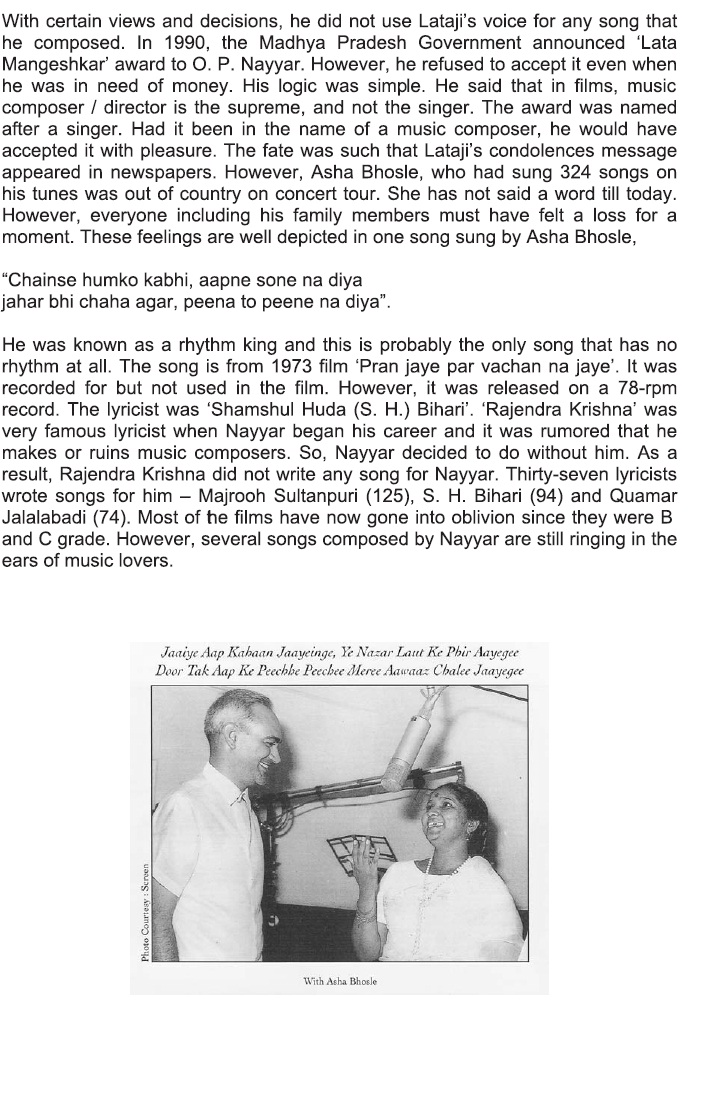 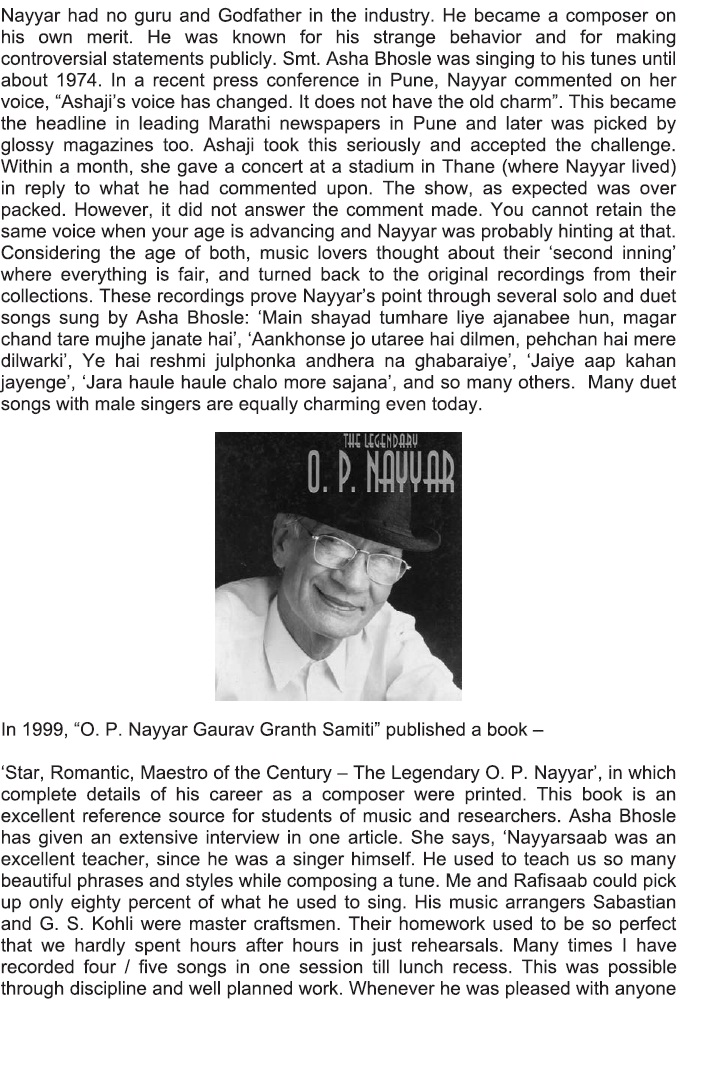 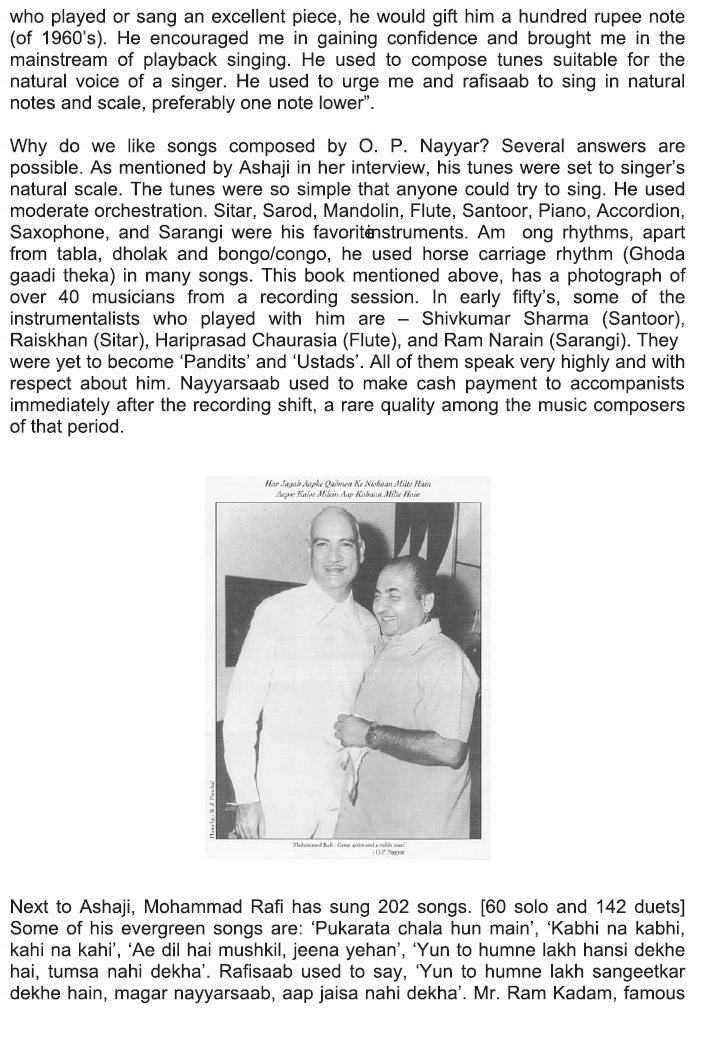 [attachmentid=342 [attachmentid=342041] 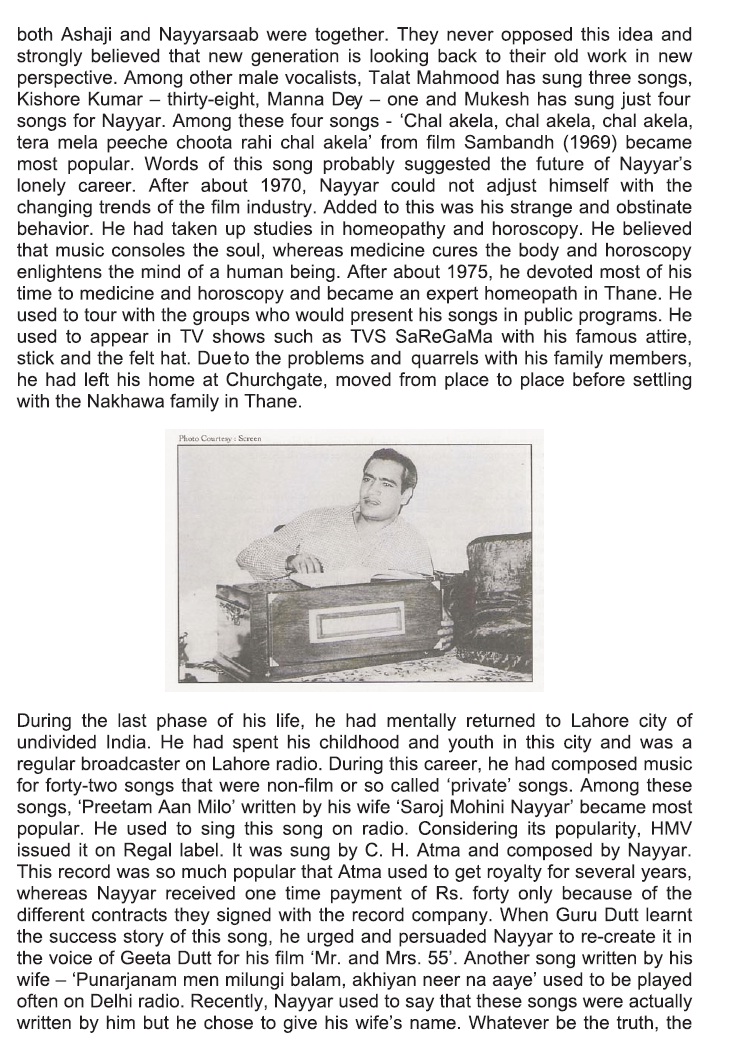 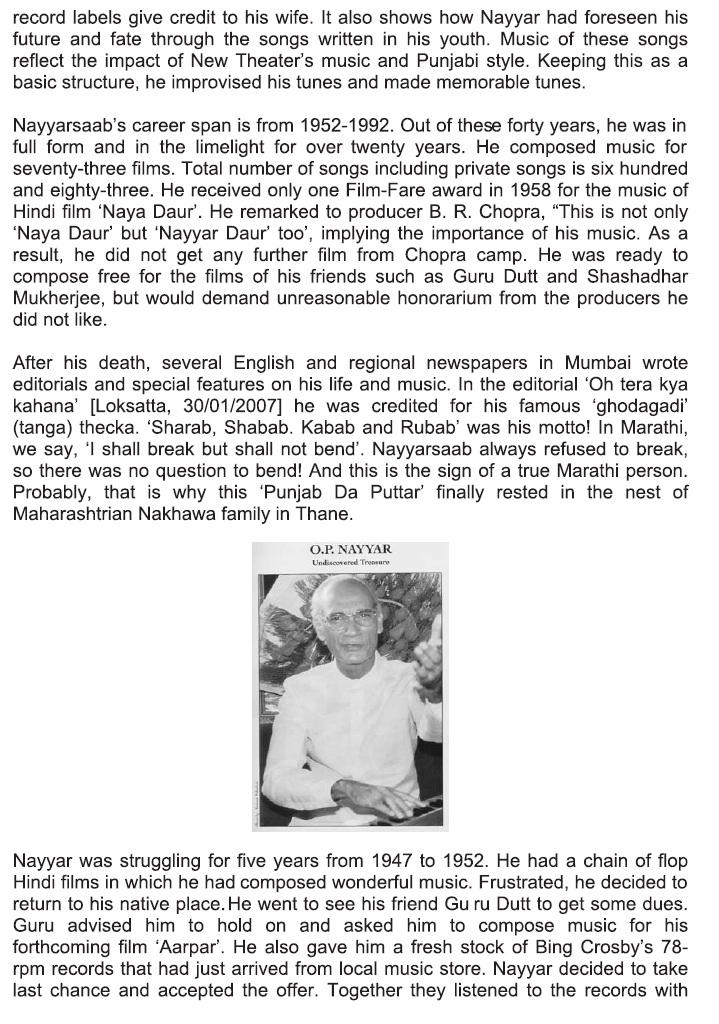 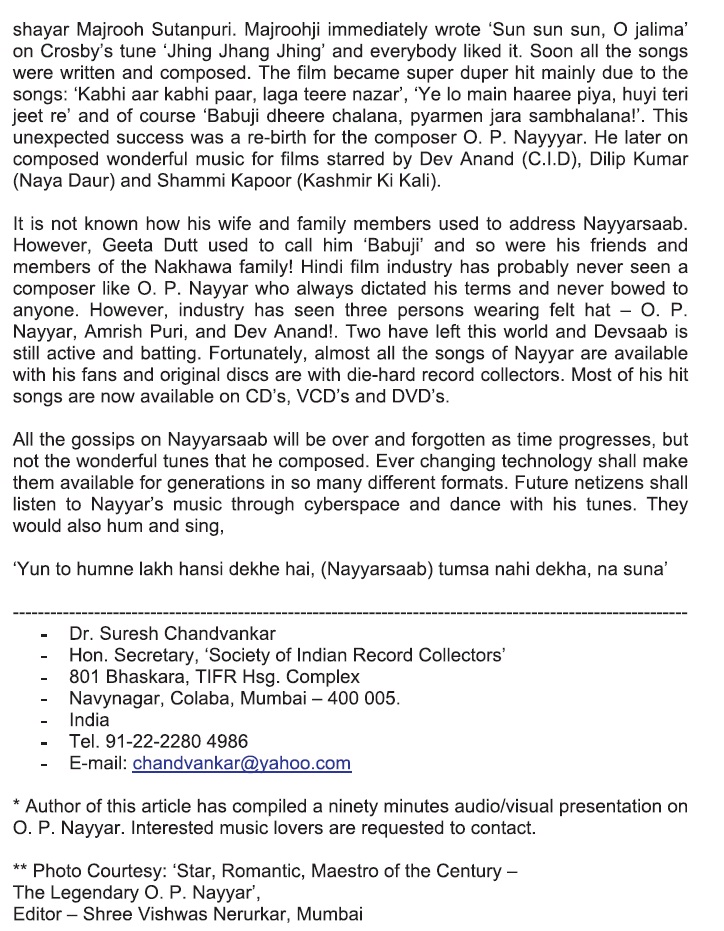 [attachmentid [attachmentid=342037] OP Nayyar I will be posting his life history in JPEG. I do not know how to directly put as graphic file. I am sure some Computer expert can download all these and put as graphic files. This article & pictures courtesy Dr Suresh Chandvankar form his SIRC meetings....Khawar |
| khawar Sohail |
 Sep 11 2010, 01:03 PM Sep 11 2010, 01:03 PM
Post
#159
|
|
Regular Member  Group: Members Posts: 837 Joined: 28-July 07 Member No.: 19849 |
Here are 3 songs from his first film Kaneez...khawar
|
| khawar Sohail |
 Sep 11 2010, 01:04 PM Sep 11 2010, 01:04 PM
Post
#160
|
|
Regular Member  Group: Members Posts: 837 Joined: 28-July 07 Member No.: 19849 |
|
| khawar Sohail |
 Sep 11 2010, 01:05 PM Sep 11 2010, 01:05 PM
Post
#161
|
|
Regular Member  Group: Members Posts: 837 Joined: 28-July 07 Member No.: 19849 |
|
| khawar Sohail |
 Sep 12 2010, 09:09 AM Sep 12 2010, 09:09 AM
Post
#162
|
|
Regular Member  Group: Members Posts: 837 Joined: 28-July 07 Member No.: 19849 |
 mughal_e_azam.pdf ( 1.65 MB )
Number of hits: 10
by members
mughal_e_azam.pdf ( 1.65 MB )
Number of hits: 10
by members An article on Mughal-e-azam by Dr Suresh Chandvankar is attached. I am attaching pdf file....khawar Attached image(s) 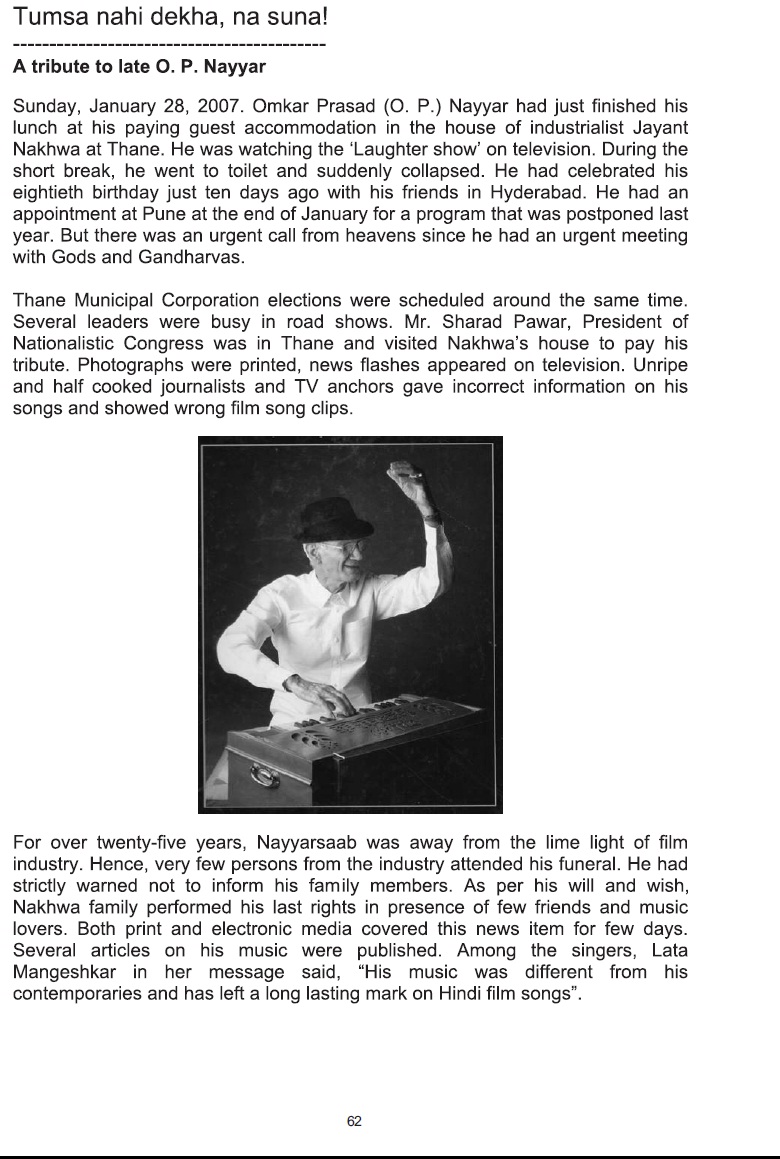 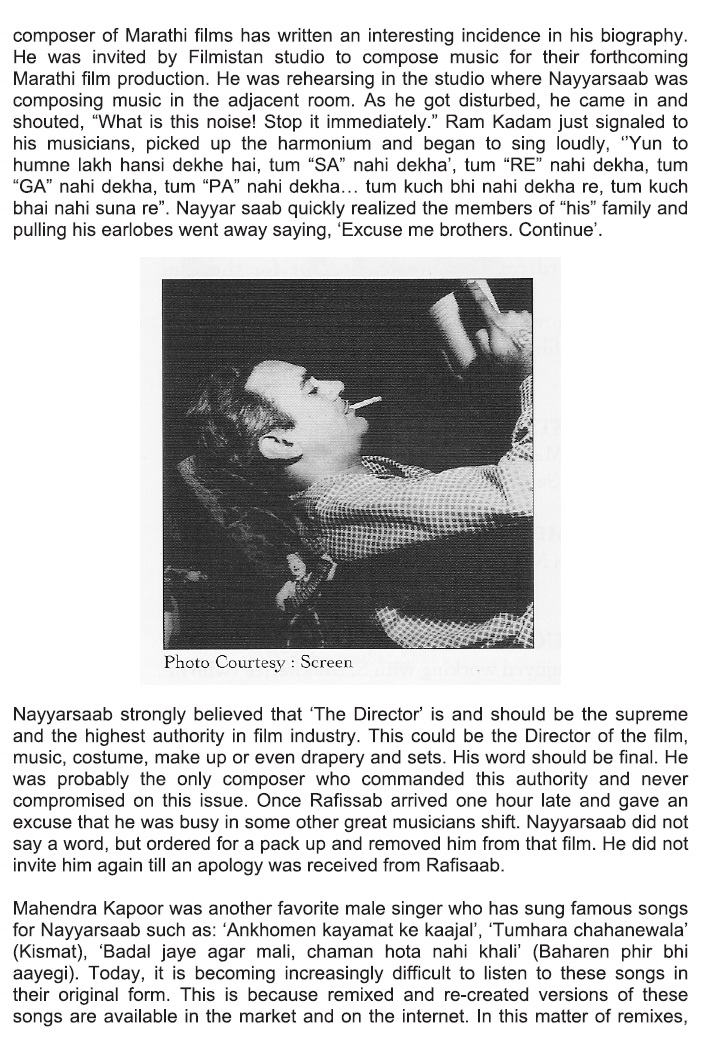
|
| khawar Sohail |
 Sep 13 2010, 07:55 AM Sep 13 2010, 07:55 AM
Post
#163
|
|
Regular Member  Group: Members Posts: 837 Joined: 28-July 07 Member No.: 19849 |
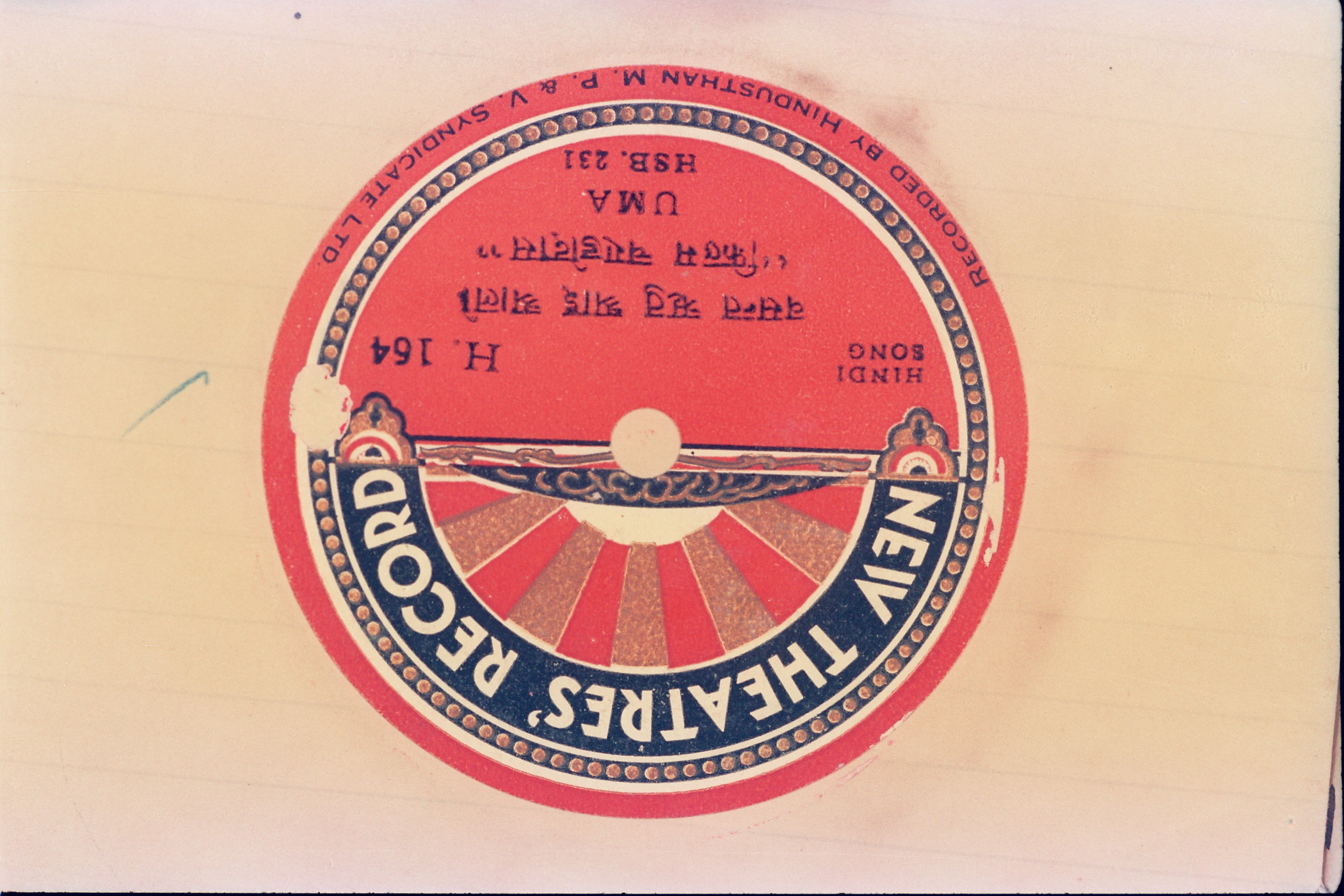 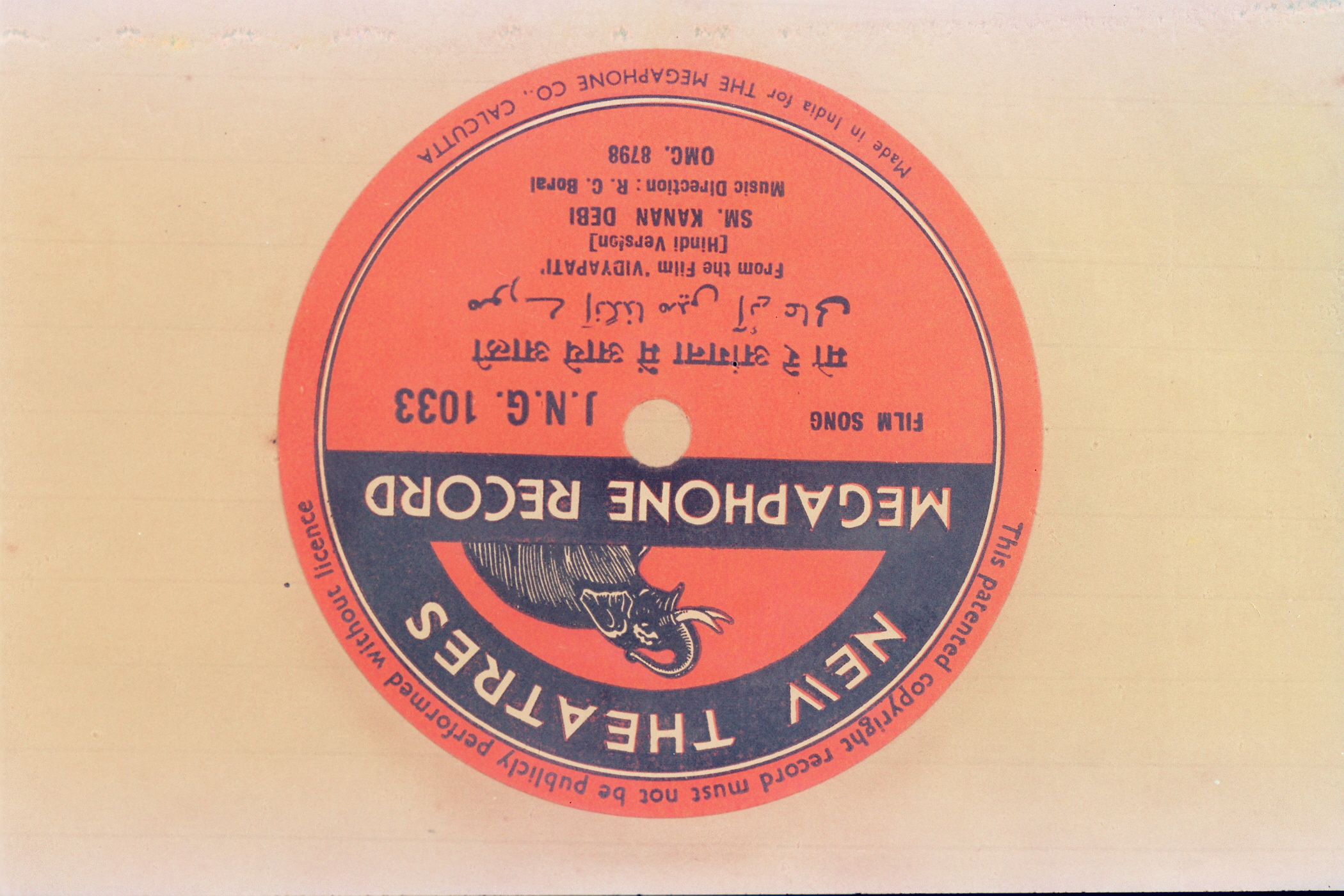 |
| khawar Sohail |
 Sep 13 2010, 07:57 AM Sep 13 2010, 07:57 AM
Post
#164
|
|
Regular Member  Group: Members Posts: 837 Joined: 28-July 07 Member No.: 19849 |
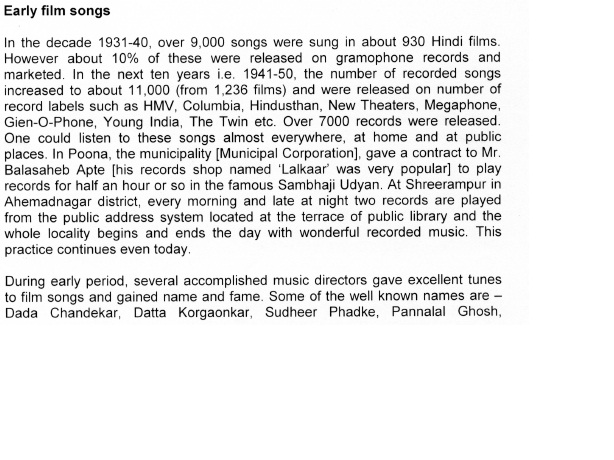 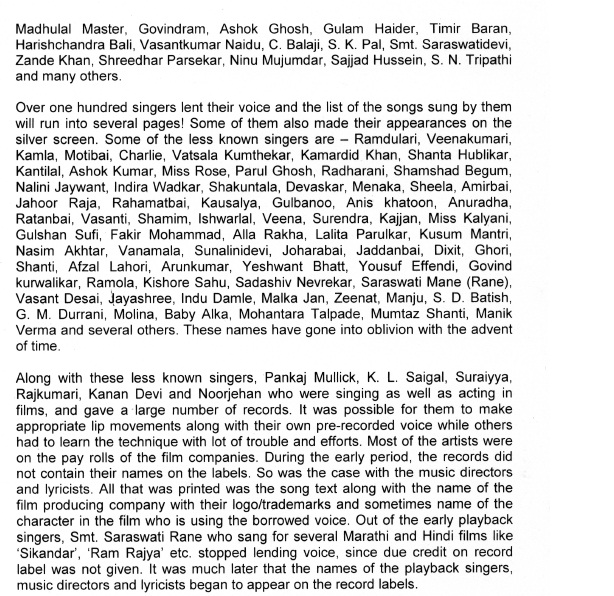 |
| khawar Sohail |
 Sep 13 2010, 01:34 PM Sep 13 2010, 01:34 PM
Post
#165
|
|
Regular Member  Group: Members Posts: 837 Joined: 28-July 07 Member No.: 19849 |
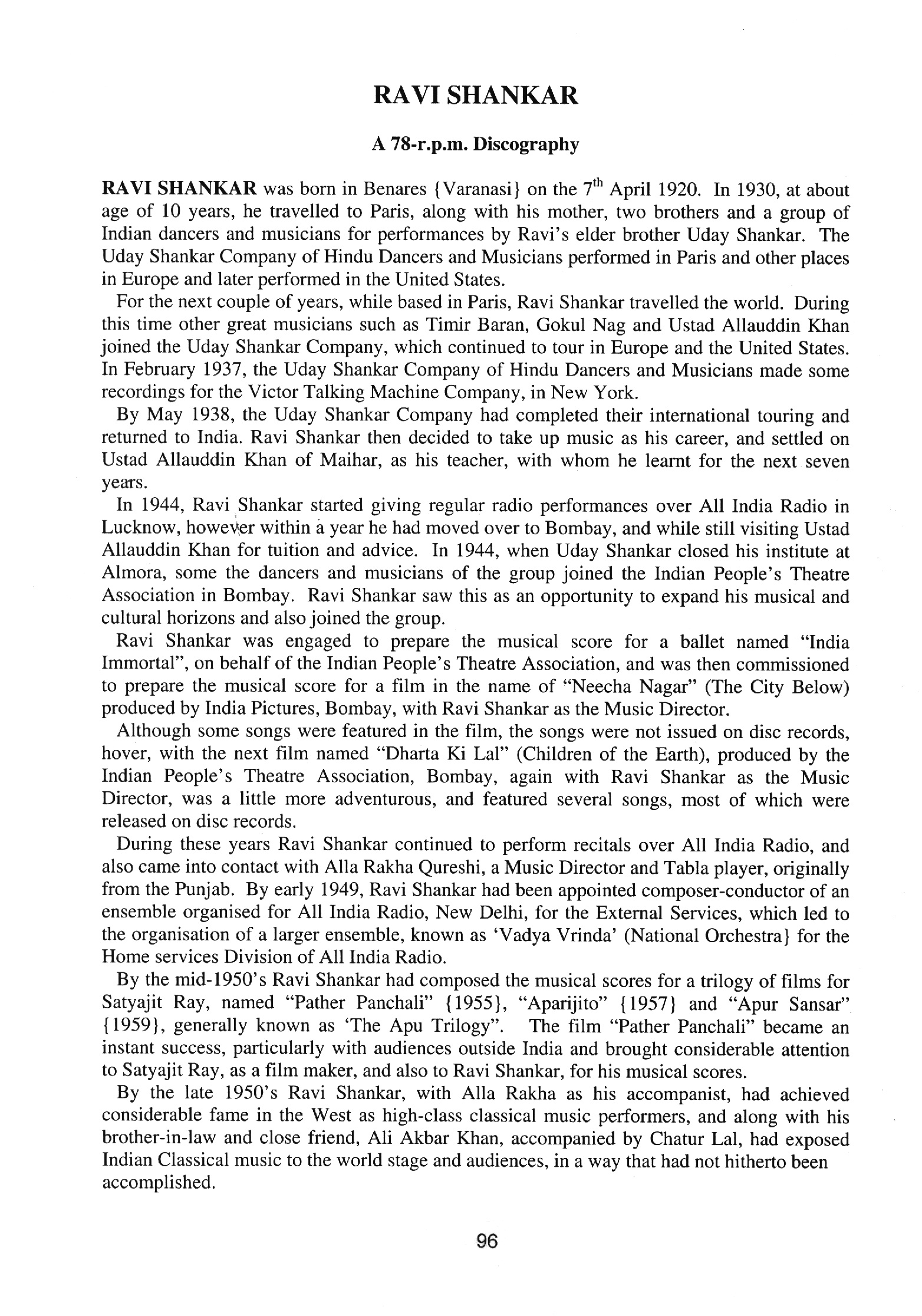 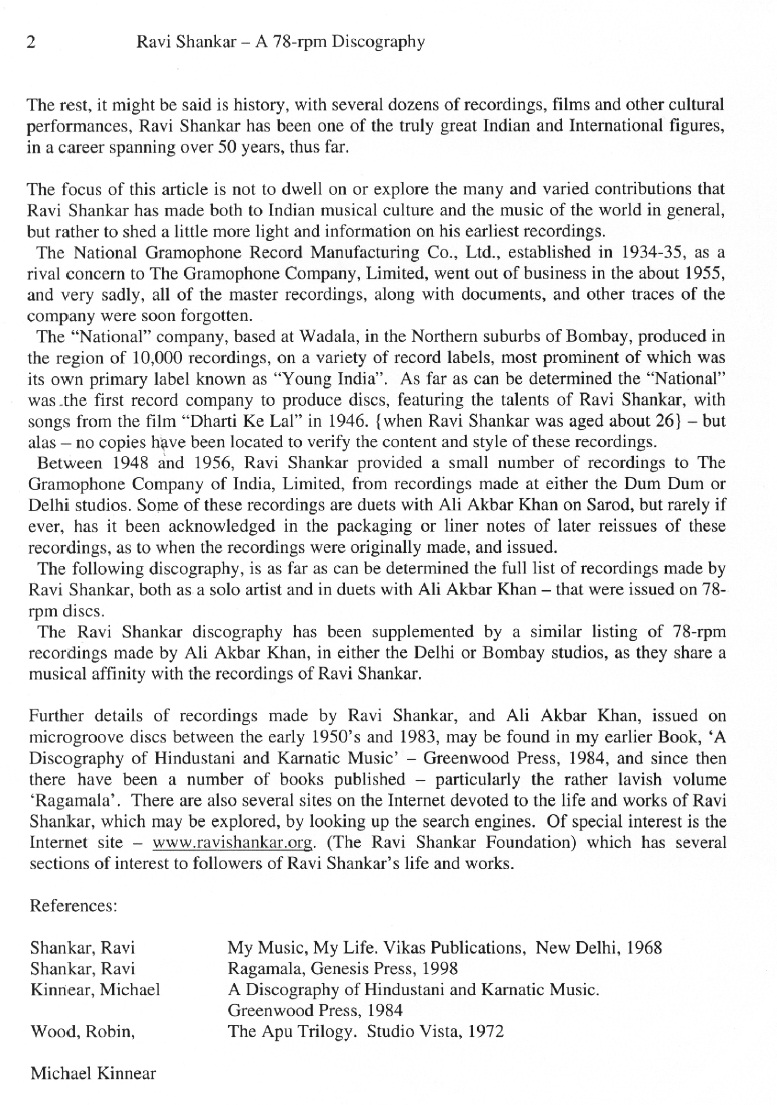 [attachmentid=342 [attachmentid=342207] |
  |
1 User(s) are reading this topic (1 Guests and 0 Anonymous Users)
0 Members:

|
Lo-Fi Version | Disclaimer | HF Guidelines |  |
Time is now: 16th April 2024 - 09:44 AM |
Invision Power Board
v2.1.7 © 2024 IPS, Inc.
Licensed to: Hamaraforums.com









